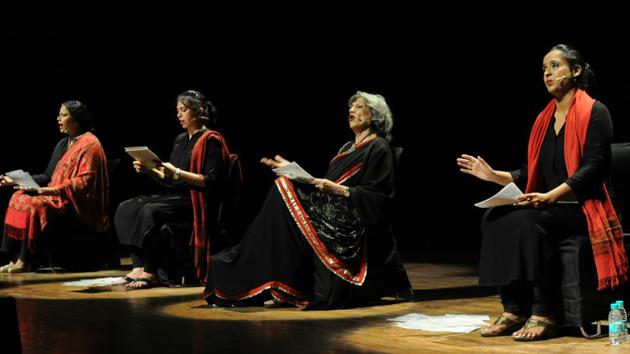The Vagina Monologues in Chandigarh: ‘If boys stay home, it’s a win-win scenario for all’
Actors were in the city to perform episodic play on sexual experiences, body image, reproduction and sex work, all through the eyes of the women
“Vagina is not an offensive word,” says Mona Ambegaonkar, a popular television actor, who performed The Vagina Monologues at Tagore Theatre on Saturday.

“At birth, a woman is distinguished from a man because of what’s between her legs, and it all starts there. A newborn is pulled out of a woman’s vagina. We all come out of a vagina. So why are we ashamed of it?” she adds.
Originally written by American feminist-activist Eve Ensler in 1996, The Vagina Monologues encompasses stories of women’s sexuality, both violent and triumphant. The episodic play has been performed across the world in different languages and talks about sexual experiences, body image, reproduction and sex work through the eyes of women. The play was first staged in India in 2003, directed and produced by Mahabanoo Mody-Kotwal and Kaizaad Kotwal. Dolly Thakore, Dilnaz Irani, Mona Ambegaonkar and Swathi Das took to the stage in Chandigarh to perform the iconic play, often considered as one of most important pieces of political theatre in the world.
One from the original cast, Dolly Thakore says, “We have performed for 15 years in this country. We have performed in cities, for policewomen and slum dwellers alike. Each time the response has been overwhelming.”
‘IN SOLIDARITY WITH VARNIKA’
The play was also staged in December 2014 at the Rock Garden for a 1,000-strong audience. But this time, the play has come to the city in the backdrop of the Varnika Kundu stalking case.
On Friday night, women took to streets for the ‘Bekhauf Aazadi’ march to reclaim public spaces. Director Kaizaad Kotwal says, “I spoke to Varnika’s father earlier and told him that we are performing the play in solidarity with Varnika. Character assassination and victim shaming aside, boys should stay home if we want our streets to be safe. Women are more responsible. If boys stay home, it’s a win-win scenario for all.”
‘ABUSE WON’T STOP’
Supreme Court recently ruled that sexual act with wife, not below 15 years, is not rape. A bone of contention for long, marital rape has mostly remained out of the ambit of the law. Then again, the 10-year-old pregnant rape survivor is in the final weeks of her pregnancy. “How can a child give birth to another child? Who will be held accountable if she dies? Her body is not developed enough to give birth,” says Thakore, who also questioned the decision on marital rape by the apex court.
“We’re selling our girls to violence. More abuse will be heaped on them and it won’t stop. When the law does not stand with women, how will society understand the concept of a woman’s well being?” asks Kaizaad.
‘IT’S POLITICAL, NOT POLITICKING’
A woman’s sexuality is her right, but the cast agrees that shame is internalised and heaped upon in a way that sexual assertion is massively threatening. A woman’s ‘happy place’ then becomes a tool to subjugate and violate her. Swathi says, “In India, the social and the political collapse. The vagina is treated as some invisible organ. This is the centre where life comes from.”
Women and girls are violated across the world in every possible way. Women are unsafe and there is a lack of sex education. Mona says, “I tell my daughter that your body is your own and you must understand it. Parents should start the conversation at home. I tell her to look at her growing body and explore it and she can always come to me to talk about her discoveries.” “Violence against women cannot stop, but when you give in and don’t challenge it, the cause is lost,” she adds.
Dilnaz says, “This is not a play any longer, it’s a movement.”





